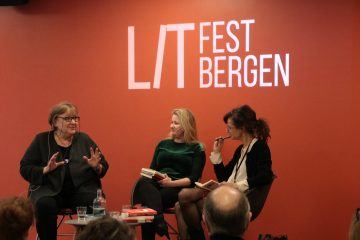Cynthia Haven in Music & Literature:
 Cynthia Haven: Violence has been a theme of this conference: Juan Gabriel Vásquez on the Colombian drug wars, three sessions for the Nigerian journalist and author Helon Habila, who spoke about the kidnapped Boko Haram girls and the ongoing terrorism in Nigeria—even the French writer and critic Raphaëlle Leyris from Le Monde noted that several books a month are still coming out on the Charlie Hebdo massacre in Paris. And today’s session on literature and evil. You, too, have written about unspeakable violence going on in the middle of Europe, at the beginning of the twenty-first century. Several have commented in Bergen on how the cataclysms of mid-century Europe seem to be revisiting us today, and they wish they could shake that feeling.
Cynthia Haven: Violence has been a theme of this conference: Juan Gabriel Vásquez on the Colombian drug wars, three sessions for the Nigerian journalist and author Helon Habila, who spoke about the kidnapped Boko Haram girls and the ongoing terrorism in Nigeria—even the French writer and critic Raphaëlle Leyris from Le Monde noted that several books a month are still coming out on the Charlie Hebdo massacre in Paris. And today’s session on literature and evil. You, too, have written about unspeakable violence going on in the middle of Europe, at the beginning of the twenty-first century. Several have commented in Bergen on how the cataclysms of mid-century Europe seem to be revisiting us today, and they wish they could shake that feeling.
Dubravka Ugrešić: The world certainly didn’t become better with the fall of the Wall, with the fall of Yugoslavia, with the independence of former Yugoslav republics, and with the switch of former communist regimes into democratic ones. What people in Eastern and Central Europe got instead of democracy are mafia structured “constellations”—economic, political, ideological. Democratura: this is the term coined by one of Yugoslav’s public thinkers. The expression plays with the words dictatorship, democracy, and caricature. Instead of the democracy most people in former communist countries dreamt of, a grotesque, state-like mixture made of revisionist elements suddenly emerged. The most dangerous of such elements was neo-fascism.
More here.
